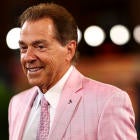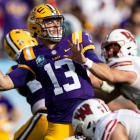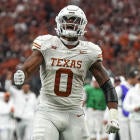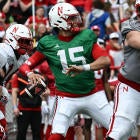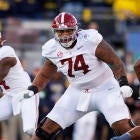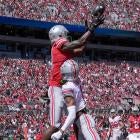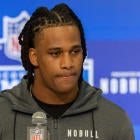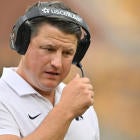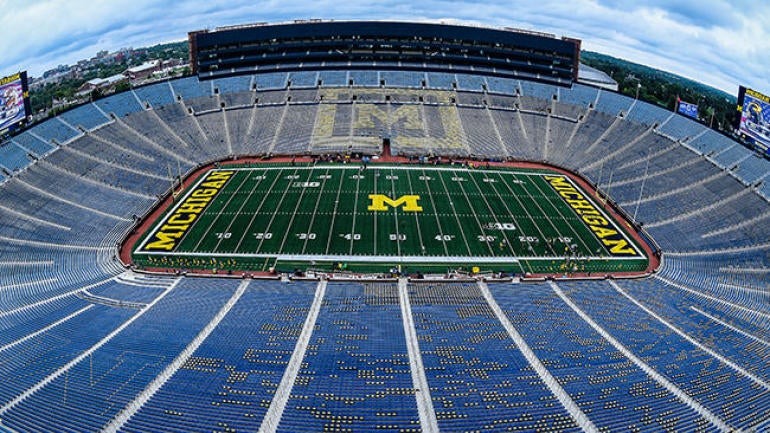
It is now a nuclear-grade conflict of silliness, this debate over playing the 2020 college football season amid the COVID-19 pandemic. Actually, calling it a "debate" is an insult to civility.
It is a battle of the science of two conferences (Big Ten Pac-12) versus the science of three (ACC, Big 12, SEC). It is parents from half the Big Ten schools demanding answers as to why their sons aren't playing in the face of what is still a raging pandemic.
On Sunday, Heisman Trophy finalist Justin Fields took the battle to a new level. Ohio State's quarterback posted a petition calling on the Big Ten to "immediately reinstate the 2020 football season."
It had more than 121,000 signatures in the first four hours, and the number continues to climb.
If it all wasn't so befuddling, it would be sad. Ask Jon Drezner, the University of Washington's team physician and a member of the Pac-12 medical advisory board.
"We are in the middle of a pandemic, our country is one of the worst controlled on the planet," Drezner said. "We have more deaths than any country. We have cases surging all over the place. We haven't done what we needed to do to play fall sports.
"And that is really sad."
The NCAA's top doctor late Saturday night said there's "no way to go forward" with fall sports without drastic improvement in testing nationwide.
But it's not over, this battle. Not by a long shot. In fact, it's getting worse and more intense.
An LSU infectious diseases expert seemed to call out the decisions by the Big Ten and Pac-12 as part of a Q&A with The Athletic.
"I would say we have seen enough to develop a safe plan. They have not," Dr. Catherine O'Neal said.
Never mind that COVID-19 has been raging in the United States basically since March. That's not enough time for most to date a future spouse, much less evaluate the second-worst pandemic in the nation's history. The most deadly occurred a century ago, the infamous Spanish Flu that killed at least 50 million worldwide.
"Not to disparage Dr. Neal at all, but if she had opined it wasn't safe to play college football this fall, I'm not sure she'd be representing the SEC much longer," said Tom Mars, a prominent Arkansas-based attorney who has battled the NCAA on eligibility issues.
That's where we are with the ACC, Big 12 and SEC hoping to play this season while the Big Ten and Pac-12 are evaluating a spring season in 2021. For now, pick a group of medical advisors for your version of the truth.
For these conferences, it starts to look like a trial where each side brings its own group of expert witnesses to make their case.
Who's right?
In this case, the jury not only decides but holds these decisions up to scrutiny bordering on ridicule. (Just read some of the responses to Fields' petition.)
The Pac-12 issued a 12-page document detailing the medical reasons that led to its decision not to play. So far, it is the only FBS conference to provide such an explanation. Big 12 commissioner Bob Bowlsby was pressed last week why his conference didn't explain the medical reasons why it is playing. He simply said playing is the "status quo."
"There's absolutely no reason whatsoever to not be completely transparent with all that information," Mars said.
Those liability waivers that players affiliated with the #WeAreUnited movement protested against just two weeks ago now seem like a necessity if the conferences that have canceled their seasons want to play.
A group of Big Ten parents asked Mars last week for advice on how to get their sons back on the field.
Mars drew up an "action plan" that started with the parents/players asking the NCAA to rescind its ban on waivers, the one requested by players in the first place. That means those players and parents would sign away the right to sue their respective schools if the players caught COVID-19.
Specifically, Mars wrote, the parties would sign a document that "extinguishes liability for negligence" and "requires [a] player to knowingly assume risks of infection."
A more detailed part from that action plan:
The NCAA made a mistake in banning "liability waivers" in response to Senator [Corey] Booker's and Senator [Richard] Blumenthal's demands. Though this decision was meant to protect student-athletes' rights, the NCAA's paternalistic reaction to the Senators' demands had the effect of depriving student-athletes of making an informed choice that would allow them to pursue their dreams.
The immediate reaction: Will parents actually agree to such a thing? The answer isn't obvious.
"I just dropped my daughter at the University of Iowa last night," said Gary Koerner, the father of Iowa defensive back Jack Koerner. "Nobody asked me to sign a waiver. Nobody promised me strict protocols and contact tracing and testing. Why is it different?"
Drezner had an equally logical explanation: "Sports are being postponed because we have a pandemic that is out of control."
One might argue: What makes football players so special? The entire country has been -- at the bare minimum – inconvenienced. There simply hasn't been enough communal cooperation in the United States, given the length and breadth of this tragedy, while foreign countries that have universally adopted mitigation measures have drastically reduced or even eliminated the spread.
What's so wrong with being overcautious? COVID-19 hot zones exist in half of the Pac-12 schools, Drezner said.
Koerner is among that group of Big Ten parents who believe there is always risk in playing the college football.
Signing a waiver could potentially be reckless, but wouldn't it now also be hypocritical? Would a portion of those players who campaigned so hard for their rights and demanded the elimination of such waivers now be willing to sign them away to play football?
The first question regarding that would have to go Clemson quarterback Trevor Lawrence: Would he and his #WeWantToPlay colleagues sign such a waiver to play?
"We strongly believe that denying these players the opportunity to play football this season would jeopardize their fitness, their happiness and their futures," Lisa and Ed McCaffrey said in a Michigan parents' letter sent to the Big Ten. (Dylan McCaffrey is a QB for the Wolverines.)
Koerner asked, if conditions are safe enough for regular students to be on campus, why can't football continue with its "strict protocols, consistent testing [and] with some of the best medical professionals around"?
It's safe to say, amid this contentious dialogue, rookie Big Ten commissioner Kevin Warren is under pressure. Some Big Ten parents hand-delivered their message to conference headquarters Friday asking for an in-person meeting.
There is something to be said for the Big Ten releasing its rationale for cancellation. For the most part, the Big Ten conference is comprised of state institutions using taxpayer money.
"In no way do I want to personally attack in any way our Big Ten leaders," Koerner said. "But being in business, all of us know what the principles of good leadership are. We know what the principles of poor leadership are."
Meanwhile, Drezner said both Pac-12 and Big Ten athletes have thanked team physicians for the decision to postpone the 2020 season.
"You also have student-athletes on the other side who wanted to play no matter what the risk," he said. "Those are individuals choices. I'm not sure this is about right or wrong."
It's about what sort of truth you want to believe. Last week, Nebraska coach Scott Frost threatened to leave the league after the Big Ten canceled its season. The Huskers could handle the coronavirus, Frost contended.
That was a different conclusion from a member of the NCAA's COVID-19 advisory panel.
"I feel like the Titanic," Dr. Carlos Del Rio said. "We have hit the iceberg, and we're trying to make decisions of what time should we have the band play.''
Medicine is supposed to be somewhat black and white, isn't it? Not always. That's why there are second opinions. That's why it's hard for some to accept even the basic concerns for playing football amid a pandemic.
"The one thing that has proven true is that, when you put people together more, you have more spread [of COVID-19]. It's an absolute truth," Drezner said.
So then how did something as serious as myocarditis become a battle? The condition has been studied and treated since the 19th century. It's a viral infection that causes inflammation of the heart. Drezner said myocarditis has been found as the cause of death in 9% of all cardiac-related deaths among college athletes.
That's without factoring in COVID-19.
CBS Sports reported last week that at least 15 Big Ten players had been diagnosed with myocarditis. The condition factored heavily into the decision making of each Power Five conference.
"There's no debate that it is clinically relevant," Drezner said.
Six years ago, Mars was running 30 miles a week with a resting heart rate of 60. A chest cold lingered. A stress test revealed an arrythmia. In the process of explaining to Mars that he had contracted myocarditis, doctors explained that he was subject to an SDE -- a sudden death event.
"I may live to be 100," Mars said. "I may drop dead on this phone call."
A different doctor who recently reviewed Mars' EKG thought the attorney had just suffered a heart attack. That was the lingering evidence of Mars' 2014 myocarditis.
This is mentioned because the seriousness of the affliction was enough for the Big Ten and Pac-12 to postpone their seasons. The ACC, Big 12 and SEC chose to plow through.
True, myocarditis can also be caused by the common cold. But adding another dreadful virus to the brew certainly doesn't help.
"That's like saying you could be hit by lightning," Mars said. "Therefore, why don't you go stand on the beach during a lightning storm with a steel rod in your hand."
Mars is in his 60s. He's not an athlete, but he's in the demographic that simply cannot afford to get COVID-19.
"I'm treating this COVID like it's a hit man with a $1 million contract on my head. I'm not taking any chances," he said. "I'm hoping somebody kills him before he kills me."
That's his truth.
College football's version of the truth amid the coronavirus pandemic is getting harder to nail down.













